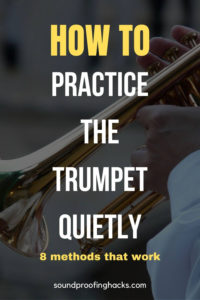How to practice the trumpet quietly? 8 methods that work
If you are an aspiring trumpeter, you will need to put in lots of time to hone your craft. The thing about living in an apartment or condo is that your neighbors are right next door, and you certainly do not want to be called out for being noisy.

So how to practice the trumpet quietly then?
There are ways to reduce the level of sound that trumpets make and you could try all of them out. I think that at one point or another, all of these tips would help you out. No more angry neighbors or your family getting distressed. How’s that sound?
Read on to find out how!
I am an Affiliate for Amazon and others, which means I may make a commission if you purchase something through the links here. There is NO extra cost to you at all, and THANK YOU so much for the support. Learn more here.
Contents: Skip to section
Ways to practice a trumpet without disturbing neighbors
The thing about being a trumpeter or any musician for the matter is that you need to practice. There is just no two ways about it. Without which you simply cannot improve and become a master.
Sadly though, not every one is accepting of such sounds, or there are circumstances in which sounds are disturbing, for example during the night when people are sleeping, when kids are studying, or people are just resting.
How can you be a considerate neighbor then? Let’s find out.
1. Talk to your neighbors first
Whether you are familiar with your neighbors or not, it would be a good idea to have a chat with them about this first. Although this can sound a bit intimidating, most people are pretty reasonable and will be willing to have a discussion.
The way to approach this is to share with them what you are doing and how much time you will need to practice. You should ask them if there are times of the day when they are not around, or if they can accommodate a 30 to 60 minutes slot where you can practice.
Remember, the key here is to make them comfortable and become an ally.
Not only will you come across as a considerate person, but you will likely make a new friend or even gain a new fan!
2. Play at a lower volume
A straightforward to reduce the volume of your trumpeting is to play your instrument softer, at pianissimo levels. There is an added benefit here in that you can fine tune your embouchure at the same time.
The problem is, you cannot do this all the time or else it will simply screw up your overall development.
While this is not the most ideal method, you should still put this into your schedule, and if you know when the neighbors are out, you can go full volume during those hours.
3. Use a practice mute
If you have never used a practice mute before, now is the best time to invest in one, particularly if you live in an apartment.
Why?
They are really do some serious noise control when you use them! A lot of times, your neighbor would probably not know that you are practicing at all. And if you play some light music over the air, the music might actually drown out the trumpet sounds.
Just put on some Chet Baker and get your practice on!
But which practice mute should you get? In my mind, there is no question that you should get the Yamaha Silent Brass system. It is widely recognized as the gold standard and used by musicians all over the world.
You are able to play to your heart’s content and yet disturb no one. How is that possible? The clever gadget stifles or mutes the sound of the trumpet, but it has a headphone connection so that you can hear yourself loud and clear.
You can even do a recording of yourself playing, or play some accompanying music along with your practice.
Tip: Do not try to do all your practice on a practice mute. There is backward pressure, which means it is not exactly the same way a trumpet normally works. You still need to practice as per usual.
Check out this video on how you can record your session with the Yamaha Silent Brass for trumpets.
https://youtu.be/IBtUKwZNIko
4. Soundproof your room
Not sure how your housing arrangement is like or the number of rooms you have, but trying to soundproof a room for your trumpet could be a budget friendly way to reduce noise, just like how I soundproofed a room for drumming.
With some basic equipment, you can easily complete this task within a day and have a pretty decent setup going on. This is not stop noise from traveling to your neighbor’s unit, but it will greatly reduce the amount of sound transmission.
Here are some basic steps you can take:
Install acoustic foam panels on your walls. You do not need to cover them 100%, but rather aim for a 40-50% coverage and you can use a chessboard type of pattern.
Use soundproof curtains or moving blankets on your windows, walls and doors. These are heavyset curtains and are designed to prevent noise from passing through them.
In most cases, windows and doors are the biggest culprits when it comes to leaking sounds, so these 2 are cheap and good fixes. A door draft stopper would be very useful too.
5. Practice in your car
Before you start thinking “What is this dude talking about”, I can assure you this is absolutely legit and is actually a really good way to put in practice time in peace.
Assuming you have a car, you can drive out to one of those large carparks like outside of Walmart or Safeway (go to one that is 24 hours). Find yourself a quiet corner and practice your heart out. It really works especially well at night, when there aren’t any crowds.
You can put down the front seats and make yourself comfortable in the back and start your practice. Even with your windows a little wound down, you will not be creating much of a disturbance to anyone.
6. Practice by the beach
Again, if you have a car and if there is a beach nearby, this might be a very good location to practice. Find yourself a non-crowded section and practice right there on the beach. Blowing into the waves can actually improve your lung capacity and endurance!
But take note though, do not do this all the time as you might blow out your chops easily.
Pace yourself and vary the amount of strength you use!
7. Rent a studio or storage unit
This is going to be somewhat hard on your pockets, so make this one of your last resorts. Otherwise, you can pair up with a few musician buddies and rent a recording studio and jam together.
The cost of renting a studio can be anywhere from $30 per hour to $500 per hour, so be sure to look around. You do not need to have a sound engineer to help you guys out, so that’s going to save you money.
An alternative is to check out storage units. They are reasonably priced, in some cases you can find one for $60 per month, and you can share this cost with your buddies. Before committing to one though, you should check with the owner if they are ok with you doing that and find out the times where there is less human traffic.
8. Check with your local university
Some universities offer up their music practice rooms for a small weekly or monthly fee. You would do well to contact your nearest one to find out more.
Frequently Asked Questions (FAQ)
Why are trumpets so loud?
Thanks to their flare design, the trumpet was made to be loud. The way they are design is to maximise the effect of the sound made on the mouthpiece into the surrounding air.
How loud is a trumpet?
Trumpets are widely known as one of the loudest instrument in an orchestra, rivalling the trombone. The level of sound it produces varies according to the way the trumpeter’s technique, and typically ranges from 80-110 dB.
How can I make my trumpet quieter?
Using a practice mute would be the best way to make a trumpet quieter. I highly recommend the Yamaha Silent Brass system for trumpets which is used by lots of musicians across the globe. There is a recording feature too that allows you to practice and record along with other music.
Can you practice your trumpet quietly now?
Now that you know so many different ways to practice a trumpet quietly, it’s time to take action!
Your neighbor and family will thank you for making the effort and caring about the well being. No doubt you will be their favorite musician from now on!
Other articles that might interest you:
- How to reduce keyboard noise on mic? 6 practical tips that work
- How to blow your nose quietly? 6 effective methods
- How to open a soda can quietly? 4 Easy Methods
- 10 Effective Ideas For Temporary Soundproof Walls
- How To Soundproof A Shipping Container? 4 Easy Steps
- 7 Best Quiet Drum Set To Practice Silently At Home!
- How To Chew Quietly Like A Ninja: 12 Tips That Works
- How to stop leather boots from squeaking? 8 steps you can try now





